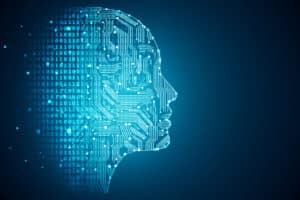At the current stage of economic development, the main objective of any company’s strategy is to improve business performance, which is achieved mainly through the introduction of various modern technologies.
One such technology is artificial intelligence (AI). It is a set of useful tools that enable digital business transformation.
The development of AI contributes to the growth of businesses and allows to change the overall format of the country’s competitiveness in the global economic market. That is why the services of ai development company are very popular today. Software engineers create quality solutions that enable effective strategies to be implemented and goals to be achieved.
AI as the Technological Basis for the Digital Transformation of the Economy
Artificial intelligence plays a significant role in the digital economy. It is present in all areas of digital transformation, as the growing amount of data exceeds the human capacity to process it.
At the beginning of computing technology development, artificial intelligence was considered a tool capable of replicating human intelligence and surpassing it. Therefore, it was used to develop the theoretical and methodological foundations of forecasting, planning, and optimization of procedures and parameters of technical and economic systems.
New approaches that began to be developed in the 21st century significantly expanded the capabilities of artificial intelligence. This allows us to consider it as a scientific direction included in the complex of computer sciences and the technologies created on its basis – information technologies. It represents a complex of technological solutions that imitate a person’s cognitive functions and allow them to achieve results comparable to the results of human intellectual activity when performing tasks.
Basic AI Components
The main components of artificial intelligence:
Data science – the process of analyzing information for making management decisions. It includes methods of collecting and processing information, risk assessment, modeling, and forecasting using information and telecommunication technologies;
Machine learning is a component of artificial intelligence aimed at using statistical methods to enable the computer to learn and improve performance during tasks;
Deep learning is based on learning data features to replace manual work with automatic or semi-automatic learning algorithms;
Computer vision is a subfield of artificial intelligence which covers the theory, methods, and technologies of creating computer machines that can detect and track objects.
Key Functional Capabilities of Artificial Intelligence
AI has the following functionality:
Predictive analytics;
Methods of control, planning, and dispatching;
Storage, processing, and presentation of knowledge;
Speech recognition and computer vision;
Biometrics, image and video segmentation, character recognition, object tracking, general vision;
Natural language processing (including extraction of new knowledge, machine translation, and dialogue).
These functions can be used independently or in combination. Accordingly, the development of basic AI technologies is based on the following:
Extraction of knowledge from various sources;
Image recognition;
Forecasting and decision support;
Machine learning;
Planning and management of purposeful behavior in unstructured environments;
Cognitive data analysis;
Multi-agent management and dispatching of resources in distributed systems.
AI Applications Across Major Industries
AI is used in various sectors of the economy. Read more on this below.
Artificial Intelligence in the Financial and FinTech Sector
Artificial intelligence technologies enable financial services market actors to reduce costs and gain remote access to consumers, leading to greater financial inclusion. Digital technologies also open access to the financial sphere for new players: mobile operators, e-commerce platforms, messengers, social networks, and other technological giants with large customer bases.
The scope of AI use in the financial sector, and the field of FinTech is constantly expanding, ranging from customer-oriented services (chatbots, personalized marketing, etc.) to internal risk management processes (transaction automation, contract analysis, automatic risk management, etc.).
AI in the Audit Industry
The audit industry has also not escaped the transformation driven by artificial intelligence. Its main features are processing huge amounts of information, ability to carry out a more complete analysis of data registers, identify significant discrepancies and risks, and respond more quickly to customer requests.
Importance of Artificial Intelligence for Marketing
In the field of marketing, artificial intelligence is often used to solve the tasks of personalization and consulting clients on their intelligent service. The technology is also widely used in advertising personalization, pattern and image recognition, real-time ad targeting optimization, customer and stakeholder segmentation, consumer sentiment research, web design automation, etc.
AI and Banking
In banking, artificial intelligence technologies are implemented in such areas as risk management and forecasting. For example, using chatbots in mobile banking apps has become widespread. This allows acceleration of work with clients. In addition, fraud protection technologies, threat analysis, and prevention based on creating special databases are used to improve information security.
The Role of AI in Production and Trade
In production, AI elements are used to control production processes, optimize them, diagnose equipment, automate, etc. The introduction of computer technologies reduces the risk of erroneous actions in the organization of the production process. In the field of trade, technologies such as analyzing the effectiveness of implemented marketing strategies, determining customer activity, developing personalized loyalty programs, purchasing management, as well as deep analytics are widely used.
Artificial Intelligence and Other Economic Industries
Artificial intelligence is also actively used in e-commerce, remote control of robots, health care, education, transport, etc. The introduction of AI elements is becoming more and more popular among managers and business owners, despite the high cost, the complexity of implementation, and the risks in use. Experts assess the degree of impact of artificial intelligence and other innovative technologies on the economy more than the impact of political risks or climate change.
Conclusion
Therefore, artificial intelligence is the basis of the digital transformation of the economy and the driving force of essential developments in the field of technology and business. AI is used in various sectors of the economy. In particular, where the identification of patterns in huge amounts of data is possible and where it is crucial to model interdependent complex systems for better decision-making. Obviously, this trend will continue in the future.
Read more:
Artificial Intelligence and Its Role in the Development of the Modern Digital Economy







